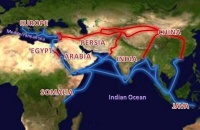Trade
From The Art and Popular Culture Encyclopedia
|
"The principal trade of the Greeks, after the Arabian conquests, consisted of three branches,-the Mediterranean trade with the nations of Western Europe, the home trade, and the Black Sea trade. The state of society in the south of Europe was still so disordered, in consequence of the settlements of the barbarians, that the trade for supplying them with Indian commodities and the manufactures of the East was entirely in the hands of the Jews and Greeks, and commerce solely in that of the Greeks. The consumption of spices and incense was then enormous; a large quantity of spice was employed at the tables of the rich, and Christians burned incense daily in their churches. The wealth engaged in carrying on this traffic belonged chiefly to the Greeks ; and although the Arabs, after they had rendered themselves masters of the two principal channels of the Indian trade, through Persia and Syria, and by the Red Sea and Egypt, contrived to participate in its profits, the Greeks still regulated the trade by the command of the northern route through central Asia to the Black Sea. The consumption of Indian productions was generally too small at any particular port to admit of whole cargoes forming the staple of a direct commerce with the West. The Greeks rendered this traffic profitable, from the facility with which they could prepare mixed cargoes by adding the fruit, oil, and wine of their native provinces, and the produce of their own industry; for they were then the principal manufacturers of silk, dyed woollen fabrics, jewellery, arms, rich dresses and ornaments. The importance of this trade was one of the principal causes which enabled the Roman empire to retain the conquests of Justinian in Spain and Sardinia, and this commercial influence of the Greek nation checked the power of the Goths, the Lombards, and the Avars, and gained for them as many allies as the avarice and tyranny of the exarchs and imperial officers created enemies. It may not be superfluous to remark, that the invectives against the government and persons of the exarchs which abound in the works of the Italians, and from them have been copied into the historians of Western Europe, must always be sifted with care, as they are the outbreaks of the violent political aversion of the Latin ecclesiastics to the authority of the Eastern Empire, not an echo of the general opinion of society. The people of Rome, Venice, Genoa, Naples, and Amalfi clung to the Roman empire from feelings of interest, long after they possessed the power of assuming perfect independence. These feelings of interest arose from the commercial connection of the West and East. The Italians did not yet possess capital sufficient to carry on the eastern trade without the assistance of the Greeks."--Greece Under the Romans (1844) by George Finlay |
|
Related e |
|
Featured: |
Trade involves the exchange of goods and services between persons or entities, often in exchange for money. Economists refer to a system or network that allows trade as a market.
Trade exists due to specialization and the division of labor, a predominant form of economic activity.
Historically, openness to free trade substantially increased in some areas from 1815 until the outbreak of World War I in 1914. Trade openness increased again during the 1920s but collapsed (in particular in Europe and North America) during the Great Depression of the 1930s. Trade openness increased substantially again from the 1950s onward (albeit with a slowdown during the oil crisis of the 1970s).
See also


